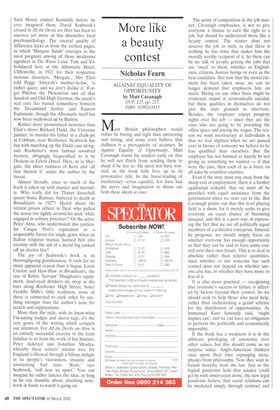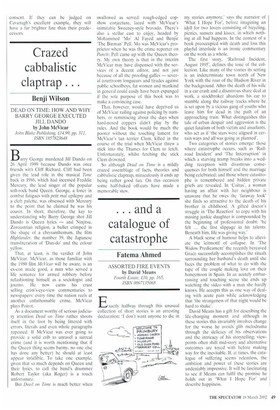More like a beauty contest
Nicholas Fearn
AGAINST EQUALITY OF OPPORTUNITY by Matt Cavanagh OUP, £25, pp. 217, ISBN 0199243433 Most British philosophers would rather be boring and right than interesting and wrong, and some even believe that dullness is a prerequisite of accuracy. In Against Equality of Opportunity, Matt Cavanagh warns his readers early on that he will not flinch from sending them to sleep if he has to. He need not have worried, as the book fully lives up to its provocative title. In the horse-trading of meritocracy versus equality, few have had the nerve and imagination to throw out both these ideals at once. The point of competition in the job market, Cavanagh emphasises, is not to give everyone a chance to earn the right to a job, but should be understood more like a beauty contest. The winner does not deserve the job as such, in that there is nothing he has done that makes him the morally worthy recipient of it. So there can be no talk of people getting the jobs that are 'owed' to them, whether as Englishmen, citizens, human beings or even as the best candidate. But now that the moral element has been taken away, we can no longer demand that employers hire on merit. Hiring on any other basis might be irrational, stupid or economically suicidal, but these qualities in themselves do not give the state grounds to intervene. Besides, the employer enjoys property rights over the job — since they are the ones who are going to be providing the office space and paying the wages. The reason we want meritocracy as individuals is that we feel slighted when we are passed over in favour of someone we believe to be less qualified than ourselves. But the employer has not harmed us merely by not giving us something we wanted — if that were the case, then each of us is beset on all sides by countless enemies.
Even if the state must stay away from the sharp end of employment, there is a further egalitarian redoubt: that we must all be provided with equal assistance from the government when we start out in life. But Cavanagh points out that this level playing field is a sham, for it merely seeks to give everyone an equal chance of becoming unequal, and this is a poor way of expressing the fact that we are all politically equal members of a collective enterprise. Instead, he proposes, we should simply focus on whether everyone has enough opportunity so that they can be said to have some control over their own future. This is to deal in absolute rather than relative quantities, since whether or not someone has such control does not depend on whether anyone else has, or whether they have more or less of it.
It is also more practical — recognising that everyone's success or failure is affected by factors beyond their control. So we should seek to help those who need help, rather than orchestrating a grand scheme for the distribution of opportunities. As Immanuel Kant famously said, 'ought implies can', and we can have no obligation to perform the politically and economically impossible.
If the book has a weakness it is in the arbitrary privileging of autonomy over other values, but this should come as no surprise today. Anglo-American thinkers once spent their time expunging metaphysics from philosophy. Now they wish to banish morality from the law. Just as the logical positivists held that science could get by with observation alone, the new legal positivists believe that social relations can be mediated simply through contract and
consent. If they can be judged on Cavanagh's excellent example, they will have a far brighter fate than their predecessors.

















































































 Previous page
Previous page